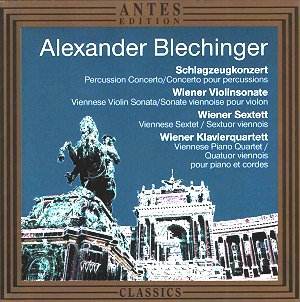Alexander Blechinger is a contemporary Viennese
composer whose music owes virtually nothing to any of the styles
to which that city is stereotypically linked, be it Straussian
waltzes or Schoenbergian dodecaphony. This is a highly enjoyable
and entertaining disc despite the rather roughly recorded live
sound, at least on some pieces. In the latter respect the opening
Percussion Concerto comes off best, with a stunning display
from both soloist and orchestra. It has five movements and each
uses the theme of an old Austrian song/hymn St. Leopold,
which bears a striking resemblance to the tune usually used for
"All Glory Laud and Honour". The variations cover quite a range,
from the motorik rhythms of the opening Allegro marziale
to the pentatonic dance band (!) of the third movement - think
The Chairman Dances but only more so. There are also more
meditative sections, the Andante atmosferico develops into
a really beautiful hunting horn heralded Alpine reverie, while
the Andantino sentimentale favours chamber-like textures
in its nostalgic soundtrack-like tread. The piece closes with
an upbeat synthesis of the preceding movement themes and demonstrate,
as indeed the piece as a whole does, Blechinger's ability to fuse
influences from folk, jazz, popular and minimalist sources to
highly listenable effect. although ostensibly a concerto, the
orchestral writing is also virtuosic and the soloist's role is
more of an obligato. Easy listening, in some ways, but
still beautifully crafted.
The Viennese Violin Sonata is apparently
inspired by the waltz and a meditation on that dance's relevance,
past and present, to its home city. The live performance is not
the most together one imaginable but the spirit of the music shines
through - I'd like to hear a studio recording, although it must
be admitted that the piece is probably overlong. The Rondo
andante starts off like Dvořįk
or the mildest Janįček before developing into a more impressionistic
direction with pentatonic figurations. Towards the end of this
first movement the music temporarily becomes more agitated and
starts to resemble Jewish/Gypsy/East European music which
I suppose is not necessarily out of context from what has gone
before, and highlights the role of Vienna and Austria as a meeting
place for a diverse range of cultures, not just the repository
of a central European tradition. The almost as long Allegro
con Valzer is a more animated movement but rather more conventional
and western sounding, although the final flourishes are quite
folksy. So overall a flawed but interesting piece of music and
the same can be said about the performance, neither ever less
than entertaining.
The Viennese Sextet, like the Percussion
Concerto, but in even lighter vein, takes traditional Viennese
themes and blends them with jazz and blues style themes to create
a totally unpretentious and often humorous pot-pourri. It might
be more worth watching the New Year's Day concert if this sort
of thing were included amongst the war-horses. Blechinger certainly
believes in being able to laugh at himself and his fellow Viennese,
naming the final Rondo after a Spanish leftover dish (Olla
podrida), the music sounding like a cross between Piazzolla and
Poulenc - great fun!
The disc ends with the Piano Quartet which
begins in an extremely jazzy and bluesy way but the second movement
is much more lyrical, by turns gentle and passionate. The final
movement is much more classical but still underpinned by jazz
rhythms and ends exuberantly, the audience's appreciation much
in evidence at the end of the tape.
Blechinger's music makes no pretence towards
being great art or highly significant in the scheme of things
but shows a humour, humility and joie de vivre all too sadly absent
in many contemporary compositions. You may hate this disc, you
may love it, if you like say Gottschalk or Malcolm Arnold you
will definitely see the point of it. I enjoyed it, it won't be
in my best of 2003 but it certainly wouldn't be in my worst either.
Neil Horner
